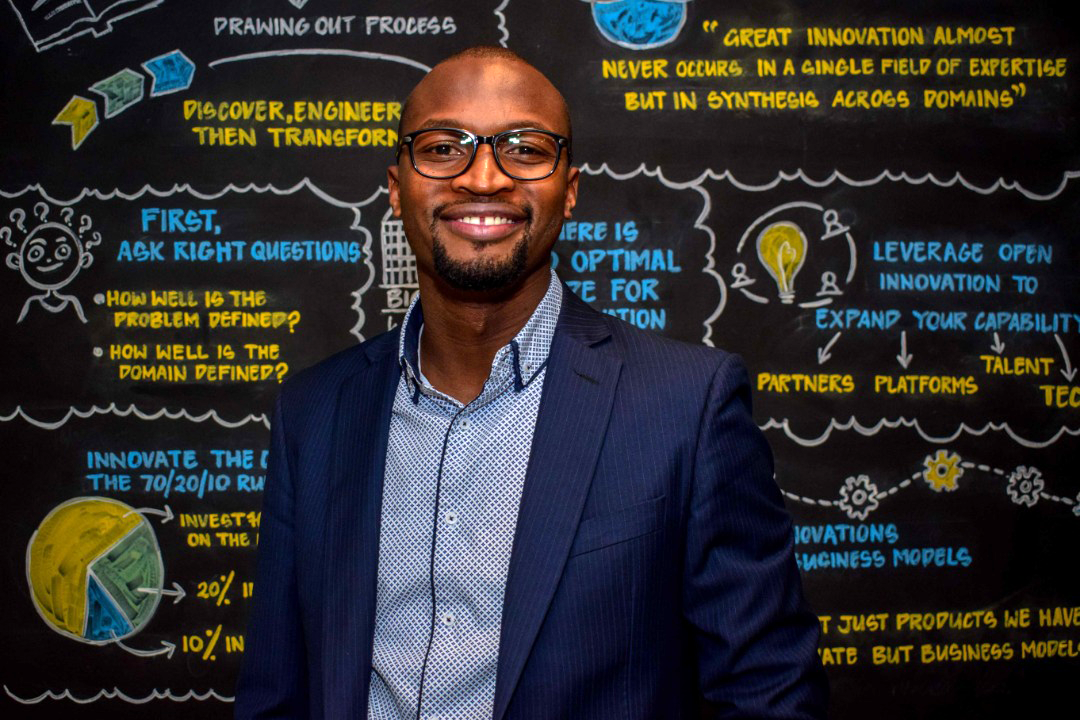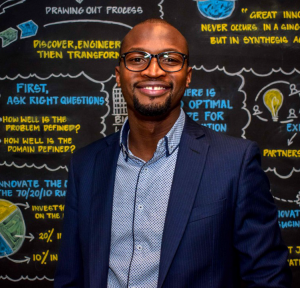
Alibaba Business School and the United Nations Conference on Trade and Development earlier this month hosted 37 Africa-based entrepreneurs at Alibaba Group’s global headquarters in Hangzhou, the latest class in their eFounders Fellowship Program.
The goal of the program is to provide small- and medium-sized enterprises in developing countries with the tools and mindset required to do business in the digital era. During the 10-day training, participants from six African countries learned about China’s digital economic transformation, Alibaba’s own successes and mistakes and the work that went into creating a company culture and management practices as they grew from a fledgling start-up into a full e-commerce ecosystem.
This was the fifth eFounders Fellowship class since the program kicked off in 2017. Since then, 164 entrepreneurs have enrolled in the course, with 89 from Africa. Alizila spoke to three Africa-based graduates who have expanded their businesses and grown into community leaders in their respective countries, thanks to what they have learned in the Fellowship. They told us how they’re helping to accelerate social and commercial progress in their home markets, what inclusive growth means to them and offered advice to aspiring entrepreneurs.

Founder & CEO, Klasha
Nigeria
Launched in 2017, Klasha is the go-to online shopping platform for millennials in Africa looking for the latest trends at affordable prices. Anuna attended the first eFounders class that same year. She later partnered with Olugbenga Agnoobla, another eFounders graduate and co-creator of fintech company Flutterwave, to expand Klasha’s payments capability to five different African currencies so that customers can skip the hassle of exchanging money. She was named one of Forbes’ 20 “New Wealth Creators on the African Continent” last year.
What were the key lessons you took from the eFounders class?
One of the major highlights from the eFounders class was the importance of rural logistics. Klasha aims to provide affordable fashion across the African continent, regardless of location. This is why we put a strong emphasis on giving customers in far-off places the same frictionless e-commerce experience as those in tier-one and tier-two cities. Another thing I learned from Alibaba is the power of big data in helping us make smarter decisions when scaling up the company. Lastly, I learned that humility, above all other characteristics, is a must as a CEO or as an employee.
How did your eFounders experience help you to more effectively empower others?
The program reaffirmed what I have always believed in: the importance of inspiring the next generation of female leaders and giving them the confidence to grow into these positions. If we want to change the economic landscape of Africa, it is important for women to take a seat at the table. At Klasha, we empower our all-female team to have expertise in e-commerce, logistics, fashion and marketing. We pay for their tuition to allow our teammates to grow and become dynamic in their roles.
How are you leveraging technology to accelerate inclusive growth in your community?
Inclusive growth means providing economic opportunities that create employment and benefit all parts of society. At Klasha, we’re leveraging technology mainly to allow us to be present in more parts of Africa. We’re working with different technology providers in payments and big data to give us the tools to grow and scale, thus providing more jobs across the continent.
What advice would you give to your fellow entrepreneurs?
Move quickly! Right now, there is a huge market opportunity in Africa. There has never been a better time to start a business in Africa, and our economy provides long-term prospects for growth. Localize your business at the start, then look outside your own country for other opportunities.
Basson Engelbrecht
Founder, Hoorah
South Africa
As a former professional triathlon athlete, Engelbrecht knows how to perform at a high level. But it wasn’t until after graduating from the eFounders program in June 2018 that he was able to take his company, e-commerce platform Hoorah, to the next level. Since returning to his hometown of Pretoria, he has expanded Hoorah to a multilayered ecosystem, including a brand-development platform, a channel for rural shoppers and an education platform that teaches e-commerce best practices to vendors and sellers.
What were the big takeaways from the eFounders class?
Africa, as a fragmented continent, offers many challenges that are very similar to those that Alibaba faced in their founding days: lack of infrastructure, lack of trust in e-commerce and lack of policies, to name just a few. But the approach that Alibaba has taken to overcome these challenges, such as company culture, prioritizing customers and curating solutions unique to its circumstances have helped it become the giant it is now. I also learned that Africa has the potential to be undivided if entrepreneurs stand together and raise their voices for a seat at the table during the policymaking process. And Alibaba taught me to imagine a more technologically advanced Africa, and that a digital African economy is very possible.
What about using your eFounders experience to enable others?
At Alibaba, we learned the importance of defining your customers. For us, customers are the sellers. To better serve our customers, we host entrepreneurial talks and seminars, and we developed the “Hoorah Super Schools Entrepreneurship League” to teach the next generation of buyers and sellers more about e-commerce. Our partnership with social development centers and schools in South Africa has created an amazing platform to share stories of fellow eFounders. We are reaching over 50,000 people per day, and we incubate high-potential entrepreneurs.
How are you leveraging technology to accelerate inclusive growth in your community?
Inclusive growth to Hoorah means “leave no man behind” in the internet era. We strongly believe that previously disadvantaged women, children and ethnic groups can be empowered through our infrastructure. Throughout our ecosystem of scouting for, finding and developing entrepreneurs, we are offering the same opportunity to all Africans, with a specific focus on promoting more equal access to wealth.
What advice would you give to your fellow entrepreneurs?
Many South African entrepreneurs are afraid to follow their dreams. As a result, many of them have great ideas as a “side hustle.” My advice to them is to get rid of plan B and pursue their dreams full-time and become a pioneer in Africa. As there is more venture capital flowing into Africa right now than anywhere else in the world, it reduces chances of a good idea failing. However, no one invests in an idea, so get an MVP [most valuable product] as soon as possible.

Cofounder and COO, Xente Tech
Uganda
Francis Nkurunungi is on a mission to turn Africa into a “cashless continent.” With over 95% of the commercial transactions in Africa still conducted with paper money, he says the move to digital payments could leapfrog its many informal economies to more mature, digital markets. That’s where Xente Tech, an Uganda-based e-commerce platform and a leading financial-products provider in East Africa, comes in.
During his two-week eFounders Fellowship training, which he shared with Engelbrecht, Nkurunungi saw for himself how mobile payments provided by Alibaba affiliate company Ant Financial changed the way that business is done in China, especially its rural areas. He hopes to replicate that success in Africa. Already, Xente has expanded into Nigeria and Kenya, allowing consumers to top up their phones, pay bills and buy movie or bus tickets via our mobile app.
What did you learn from your eFounders experience?
I learned about the urgency of thinking globally and acting locally.Data is key in all operations of any digital business and should always be a key focus. Moreover, it is about solving a problem that is faced by society. To be successful and sustainable, you can’t just focus on how to generate profit and expand your market share. You must focus on how your services and products can help the maximum number of people.
We expanded our operation immediately after I came back, launching the Xente app in Nigeria and Kenya. While we are trying to achieve a “global” scale, starting in Africa, each operation in a different country is approached from a local perspective. We also implemented multiple measures to make sure our vision is aligned across the whole team, just like I saw at Alibaba. This has greatly boosted our team’s overall output.
How have you been able to help others since you’ve been back?
I teamed up with other eFounders graduates in Uganda to hold a meeting of 100 young entrepreneurs to share ideas, exchange views and brainstorm about the next steps for turning Africa into a digital economy. We also invited key stakeholders and government leaders to join the conversation. As said during the eFounders class, entrepreneurs can create new business models and job opportunities, but it is up to the government to establish the complementary infrastructure and policies.
How are you leveraging technology to accelerate inclusive growth in your community?
The goal of Xente is to speed up Africa’s digital transformation. Our application allows young people all over the continent to gain a better livelihood, providing a source of income for them and ensuring digital inclusion in these communities.
What advice would you give to your fellow entrepreneurs?
To stand firm, don’t lose the passion, and know that no vision is too small – as long as you execute on it.
Applications for the seventh eFounders Fellowship class, which will run Aug. 18-18, open on June 9. Entrepreneurs from Algeria, Ethiopia, Ghana, Morocco, Nigeria, Senegal, or Tunisia are encouraged to apply. Interested? Get more details here.





